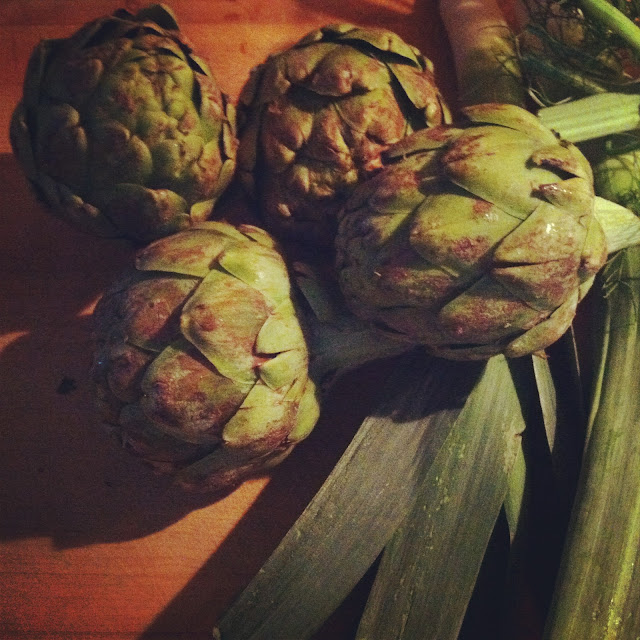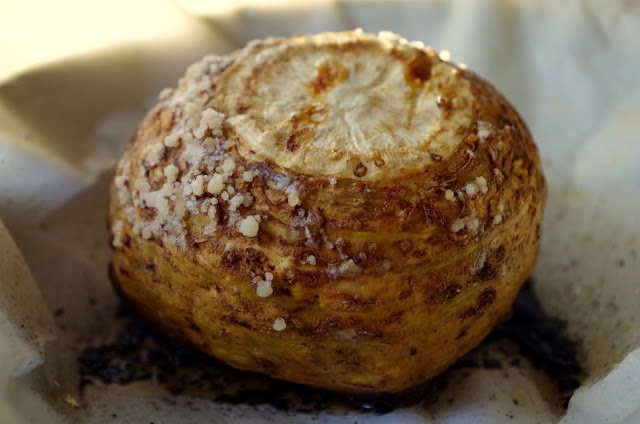Papparadelle and Spring Vegetable Ragout
Spring! Spring! The farmers markets are slow to bring out the bounty but it's true--spring is trying it's hardest to be here. Dull roots are stirring. Lilacs are breeding. How I love April, if only because I get to read Eliot:
Oh, I love the opening stanza to the opening section of The Waste Land. The painful enjambment of the opening three lines, the end stop, then two more enjambments and another end stop. We're on edge, hanging onto participle phrases. But it's spring. We're supposed to be blossoming, but spring won't let us, and when it does, such growth is painful. We seemed so much more satiated with the warm covering of snow. Oh, and then there's that breathless repetition of Marie, once herself in the spring of youth. The resignation and safety and barrenness of going south in the winter. The knowledge there will be no more mountain sledding with cousin archduke once spring comes around. No wonder we're so reluctant to give up winter and head into spring.
But then spring means that there are fava beans and artichokes and leeks and fennel! Oh Marie, Marie. Let go of winter. There are vegetables to eat! Don't go south--you'll miss out on the rain, which has been falling all day and night for the past 36 hours (and isn't supposed to stop until the weekend). That means there will be mushrooms again soon. And there's asparagus and peas and cherries and the first strawberries just around the corner. Oh Marie, Marie. There's winter to let slip away and spring to let slowly creep in.
I know, I know. It's not fashionable to love The Waste Land or pasta primavera (which this Greens recipe is, although all gussied up). But I do. I do. I love the buttoned up repression of Eliot with his rolled trousers and his severely parted hair. And I love the 80s spotlight on pasta primavera, complete with oodles of butter. And let's face it, this is Deborah Madison's glamorized pasta primavera, what with fava beans and artichokes. While time consuming to prep the artichokes and shell the beans, this pasta tastes green and light and verdant. Verdant! When was the last time you ate something verdant? So take the time. Carve out the chokes. Squeeze the beans from their casings. Rinse the leeks in a change of water. And then settle in with a bowl of pasta and listen to the end of winter. I think you can hear it now.
Papparadelle and Spring Vegetable Ragout
Adapted from The Greens Cookbook
Yield:
Serves 4
Ingredients:
1/2 pound papparadelle
Serves 4
Ingredients:
1/2 pound papparadelle
2 leeks, white parts only
4 medium artichokes
juice of 2 lemons
1 1/2 pounds fava beans
3 tablespoons olive oil
2 cloves garlic, finely chopped
1 small fennel bulb, trimmed, quartered and sliced into 1/4-inch pieces
2 teaspoons tarragon, chopped
salt
3 tablespoons butter
1 tablespoon parsley, chopped
pepper
Parmesan
Instructions:
1. Bring a large pot of water to boil.
2. Slice the leeks in half lengthwise; then slice about 1/4 inch thick. Wash them well.
3. Put the lemon juice into two cups of water. Remove the stem from each artichoke and discard the dark outer leaves, snapping them off at the base, until you reach the pale inner leaves. Cut off the top two thirds of the leaves and trim round the base. Quarter the artichokes and remove the choke with a paring knife. Place the pieces in the acidulated water, so that they won't turn brown.
4. Warm the olive oil in a wide skillet. Add the leeks and the drained artichokes, and saute for one minute over medium-high heat. Add the garlic, fennel, tarragon and some salt; then pour about 1 1/2 cups of water from the pasta pot. Cover the pan, lower the heat, and stew until the artichokes are tender, about 15-20 minutes.
5. Meanwhile, shell the fava beans an cook them in the pasta water for about 1 minute. Remove them to a bowl of cool water, then one by one, squeeze the outer pale green skin to release the bright green bean underneath it. Set aside.
6. Add the pasta to the water and cook until the noodles are done--about 6-7 minutes. Drain.
7. In the last 2 minutes of cooking the artichoke mixture, add the butter and the fava beans.
8. Combine the pasta and the vegetable ragout, and toss well with tongs to coat the noodles with the sauce. Season with pepper and Parmesan.










Comments
Post a Comment